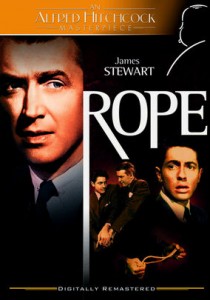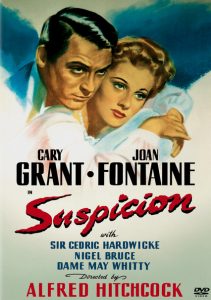Rope-1948
Director Alfred Hitchcock
Starring Farley Granger, John Dall, James Stewart
Top 250 Films #26
Scott’s Review #323
Reviewed January 5, 2016
Grade: A
Rope (1948) is one of my favorite Alfred Hitchcock films and a film that flies under the radar amongst his catalog of gems. Made in 1948, the movie, set as a play (and based on a 1929 play), uses one set only and appears to be one long take, making it an understated film.
The action takes place inside a luxurious Manhattan apartment with a stunning panoramic skyline. Intelligent with subtle nuances that in current viewings are not as subtle, the tiny (nine) cast is fantastic at eliciting a fine story that never seems dated.
Starring Hitchcock stalwart Jimmy Stewart, the film features Farley Granger (Strangers On A Train, 1951) and John Dall.
Granger and Dall portray Phillip and Brandon, two college students who strangle a fellow student as an experiment to create the perfect murder. Immediately after the murder, they host a dinner party for friends, including the father, aunt, and fiancée of the victim, all in attendance.
Stewart plays Brandon and Phillip’s prep school housemaster, Rupert Cadell, who is suspicious of the duo.
To further the thrill, the dead body is hidden inside a large antique wooden chest in the center of their living room, as their housekeeper unwittingly serves dinner atop the dead body.
The film is macabre, clever, and quite experimental.
The very first scene is of Phillip strangling the victim, David, with a piece of kitchen rope, which is an unusual way to start a film. Typically, there would be more buildup and then the climax of the murder, but Hitchcock is far too intelligent to follow the rulebook.
Ironically, Phillip is the weak and submissive one, despite having committed the crime. Brandon is dominant and keeps Phillip in check by coaxing him to be calm and in control.
The fact that many of the guests have a relationship with the deceased, munching on their dinner while wondering why David is not attending the party, is gleeful irony. Plenty of drinks are served, and as Phillip gets drunker and drunker, he becomes more unhinged.
The film reminds me of some aspects of Who’s Afraid of Virginia Woolf, also based on a play and primarily featuring one set – both dinner parties with alcoholic consumption, secrets, and accusations becoming more prevalent as the evening progresses.
The plot unfolds chillingly throughout one evening as Rupert slowly figures out that what he had previously taught Brandon and Phillip in an intellectual, hypothetical classroom discussion has been taken morbidly seriously by the two.
The homosexual context is hard to miss in this day and age, but remarkably, it was over the heads of the 1948 Production Code censors, who had no idea of what they were witnessing.
Phillip and Brandon are a gay couple who live together, and Hitchcock has admitted to this in later years. If watched closely, one will notice that in any shot where Brandon and Phillip are speaking to one another, their faces are dangerously close, so we can easily imagine them kissing.
This is purely intentional by Hitchcock.
Rope (1948) is a daring achievement in innovative filmmaking. It should be viewed by any aspiring filmmaker or anyone who enjoys robust and clever camera angles and stories, seeking an extraordinary adventure in a calm, subtle, and engaging narrative.

